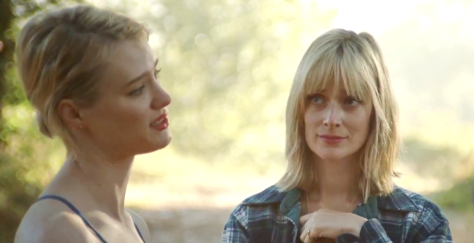Always Shine, directed by Sophia Takal, is a film that would have benefited from a little less ambition. As a tense psychological thriller about the friendship and rivalry between two actresses, it has a gimlet eye for both female competition and Hollywood’s treatment of women; as quasi-Lynchian surrealism, it’s weak and harried, with a flurry of cuts and distorted vocals not making up for the absence of any genuine weirdness. Fortunately, the thriller part of the film is strong enough that the movie is still worth a look, especially if you’re interested in either a subdued, warty look at the lower rungs of Hollywood or a take on the perennial themes of The Talented Mr. Ripley.
The film centers on Anna and Beth, two longtime friends who are due to spend the weekend together in Big Sur. Beth (Caitlin FitzGerald) has perfected a kind of compliant helplessness: in the one audition of hers that we see, she’s playing a woman tearfully begging for her life, offering up her body in exchange for any mercy, and that is, we discover, what her career has largely consisted of–not in terms of the role but in terms of how she’s been treated. Her career has finally taken flight, but at the cost of her being consistently willing to take her clothes off. The faceless men overseeing this particular audition make it clear that even more nudity will be expected of her in this role, which they dignify with the idea that everything will be shot “very verité,” a weak artistic rationale for her needed nudity–“Don’t worry, sweetheart, we’ll make sure you look beautiful.” The constant sexualizing Beth faces in the course of her work is taking a toll on her relationship with her boyfriend, too. But it is, finally, getting her ahead, getting her starring roles and magazine profiles.
Anna (Mackenzie Davis), meanwhile, hasn’t had the same luck–good or bad. She’s stuck scraping along through auditions–a possible central role in an experimental short film made by a friend is honestly the best offer she’s had in a while. She’s as good an actress as Beth, or even better, but her presence is more forthright and occasionally abrasive.
It’s not destined to be a good weekend. A night out, early on, shows exactly how wrong things are going to go, as the women meet a slightly older man who’s at Big Sur with his “men’s group,” which Anna playfully needles him about, unable to contain her curiosity at what the hell that is, exactly. Her interest in him his obvious, and her flirtation and flattery are direct–which may be as much of a turn-off for him as the questions that slightly deflate his ego. (The movie is astute about the way Beth’s sexual compliance is rewarded while Anna’s active sexuality is punished; their world is full of men who want women to go along but not, crucially, to have active desires of their own.) He leaves the table… and asks out Beth, who’s been nearly silent and noncommittal the entire night, thereby offering a kind of passive beauty he can project onto. Anna oversees this, her jaw working slightly. It’s one more thing that Beth has won by just meekly going along.
The situation intensifies when Anna finds out that Beth has hid career opportunities from her and when Beth realizes just how much Anna has started to despise her. It would be easy for the film to sympathize with one character over the other, but Takal deals out empathy with a relatively even hand. Beth’s nonconfrontational desire to just go along and not make trouble is understandable, as is her shyness, but Takal’s clear that she’s not wholly innocent in this; those same impulses lead her to lie and hold on to resentments. Meanwhile, Anna is more openly contemptuous, but she’s also, in her constant open wanting, very vulnerable. The film gradually pushes the two of them to a climax that will decide both who wins and what personality type wins–which may not be the same answer.
All of this makes for a strong emotional core, with vivid performances and well-observed bits of social agony, and it’s a shame that Takal clutters it up with both unnecessary surrealism and unnecessary formal frills. More of that surfaces as the film goes on, which unavoidably weakens the last third. But this is still an interesting little thriller.

